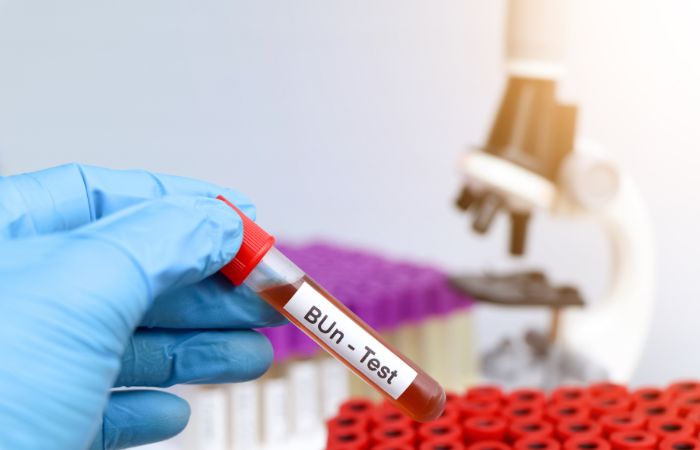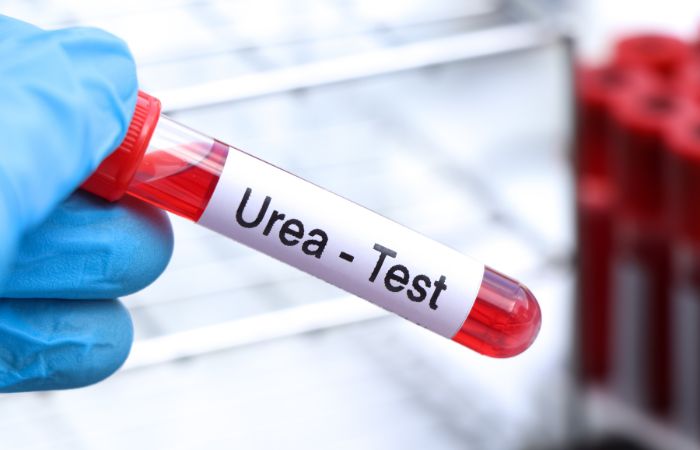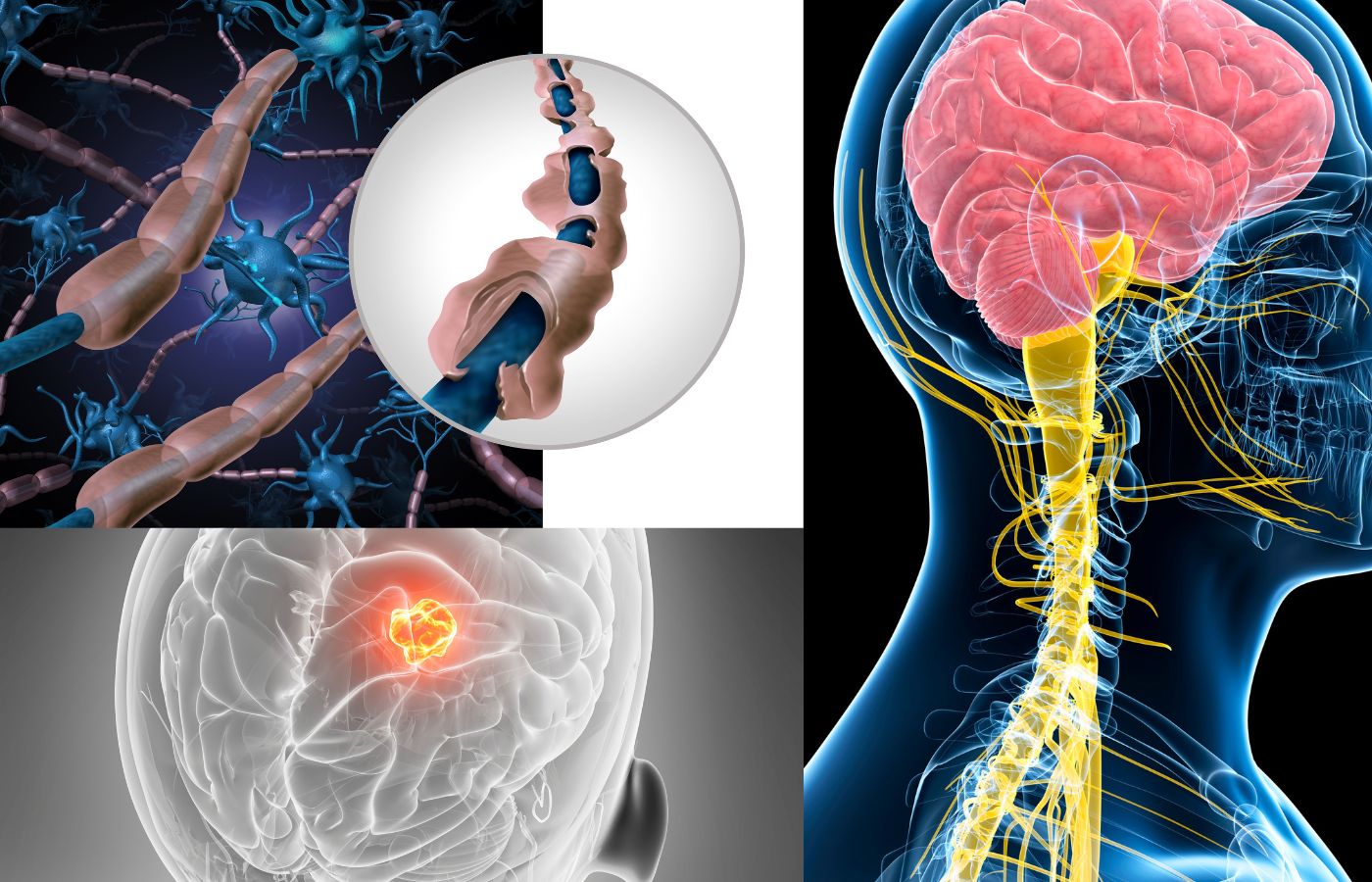
The Blood Urea Nitrogen (BUN) test is a common and important pathology test used to measure the amount of urea nitrogen in your blood. Urea nitrogen is a waste product produced when the body breaks down protein. The kidneys filter urea nitrogen from the blood, so the BUN test is often used to assess kidney function. Elevated or low levels of BUN can indicate kidney or liver issues, dehydration, or other underlying health conditions.
The BUN test measures the concentration of nitrogen in your blood that comes from urea. Urea is produced in the liver as a byproduct of protein metabolism, and it is eliminated from the body through urine. Healthy kidneys filter urea from the bloodstream and excrete it in urine. Therefore, the level of urea nitrogen in your blood can be a good indicator of how well your kidneys are functioning.
Increased levels of BUN may indicate that the kidneys are not filtering waste properly, which can occur due to kidney disease, dehydration, heart failure, or a high-protein diet. Low levels of BUN may be associated with malnutrition, liver disease, or overhydration.
The BUN test is essential for monitoring kidney function and assessing the health of your kidneys. The kidneys play a crucial role in filtering waste from your body and regulating fluid and electrolyte balance. When the kidneys are not functioning properly, waste products such as urea nitrogen can build up in the bloodstream, leading to elevated BUN levels.
Here's why the BUN test is important:
1] Monitoring Kidney Health: The BUN test is often used to check the health of the kidneys. Elevated BUN levels can indicate kidney dysfunction, which may require further testing and intervention.
2] Detecting Dehydration: High BUN levels can also be a sign of dehydration, as the kidneys retain urea in the bloodstream when the body lacks sufficient fluid.
3] Assessing Liver Function: The liver produces urea, so abnormal BUN levels may indicate liver dysfunction or damage.
4] Evaluating the Effects of Medication: Some medications, especially those used to treat chronic conditions like diabetes and high blood pressure, can affect kidney function. The BUN test helps doctors monitor kidney health in patients taking these medications.
If you’re experiencing symptoms like fatigue, swelling, changes in urination, or difficulty concentrating, your doctor may recommend the BUN test to assess kidney function and detect underlying issues.

The BUN test is a simple blood test that requires only a small sample of blood. The process typically involves the following steps:
A healthcare professional will take a blood sample from a vein, usually in your arm. The procedure is quick and generally doesn’t cause much discomfort. The blood sample is then sent to a laboratory for analysis.
The blood sample is analyzed to measure the amount of urea nitrogen in the bloodstream. The laboratory uses a specialized technique to measure the BUN concentration in the blood and generate the results.
Your BUN levels will be compared to normal reference ranges to determine if they are within the expected range. Normal BUN levels typically range from 7 to 20 milligrams per deciliter (mg/dL). However, this range can vary depending on factors such as age, diet, and overall health.
Abnormal BUN levels may indicate several health conditions. It’s important to interpret BUN results alongside other tests and clinical assessments for a comprehensive understanding of your health.
High BUN levels are often a sign of kidney dysfunction or dehydration. Some potential causes of elevated BUN levels include:
1] Chronic kidney disease: Reduced kidney function results in less waste being filtered from the blood, leading to elevated BUN levels.
2] Acute kidney injury: Sudden damage to the kidneys can cause a rapid increase in BUN levels.
3] Dehydration: When you are dehydrated, your kidneys conserve water and increase urea levels in the bloodstream.
4] Heart failure: Reduced blood flow to the kidneys can lead to kidney dysfunction and high BUN levels.
5] High-protein diet: A diet rich in protein can increase urea production, leading to higher BUN levels.
Low BUN levels may indicate conditions that affect the liver or malnutrition. Potential causes of low BUN levels include:
1] Liver disease: The liver produces urea, so liver dysfunction can lead to lower BUN levels.
2] Malnutrition: Insufficient protein intake can result in low urea production and low BUN levels.
3] Overhydration: Excessive fluid intake may dilute the blood and result in lower BUN levels.
Typically, no special preparation is needed for the BUN test. However, it’s a good idea to inform your healthcare provider if you are taking any medications or have any health conditions that may affect your test results. Some medications, such as diuretics or antibiotics, may influence BUN levels, so your doctor may recommend adjusting or temporarily stopping certain medications before the test.
In most cases, the test is performed as part of a routine blood test during a health checkup, or when specific symptoms arise that may indicate kidney or liver dysfunction.
The cost of the Blood Urea Nitrogen (BUN) test is generally affordable. At Diagnopein, the cost for a BUN test is Rs. 150/-. This makes it an accessible option for individuals seeking to monitor their kidney function and overall health without incurring high medical expenses.
If you’re searching for a pathology test near mein cities like Mumbai, Pune, Nagpur, or Delhi, Diagnopein offers affordable and reliable testing services. Our experienced staff and state-of-the-art laboratories ensure that you get accurate results every time.
Diagnopein is a trusted name in the healthcare industry, providing high-quality pathology tests at affordable rates. Here’s why you should choose Diagnopein for your BUN test:
1] Accurate Results: Our team of experts ensures accurate and timely results for your BUN test.
2] Convenient Locations: With clinics in Mumbai, Pune, Nagpur, and Delhi. Diagnopein is easily accessible for patients in these areas.
3] Affordable Pricing: The cost of the BUN test is Rs. 150/-, making it an affordable option for individuals who want to monitor their kidney and liver health.
4] Professional Service: Our staff is trained to provide a smooth and comfortable experience for all patients.

